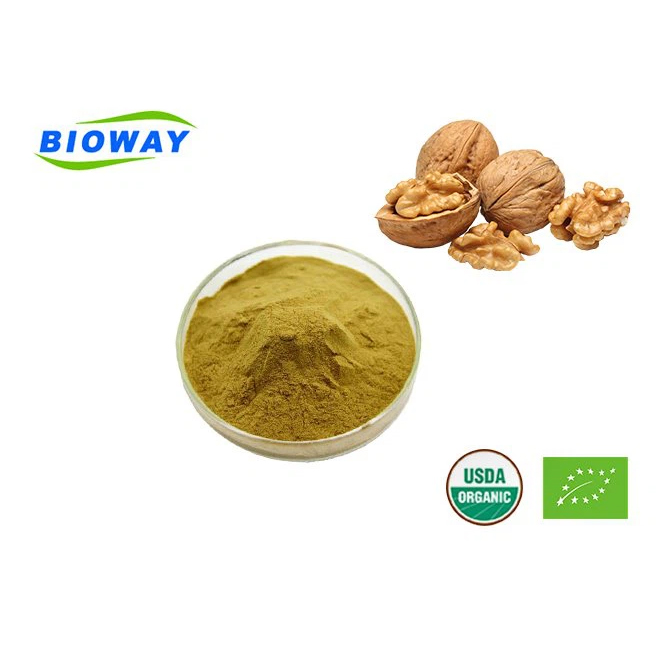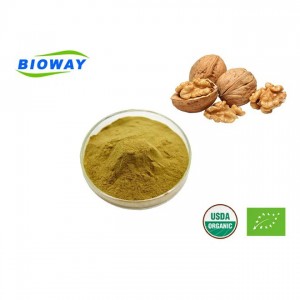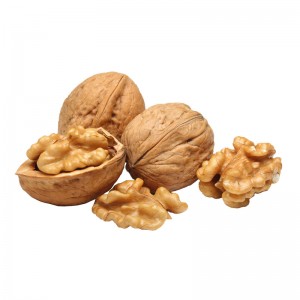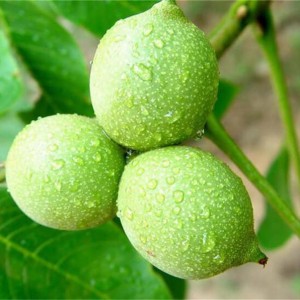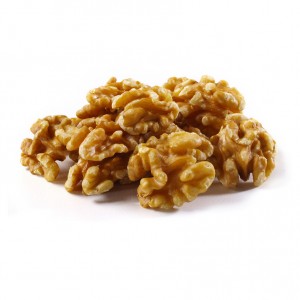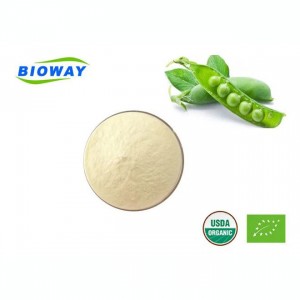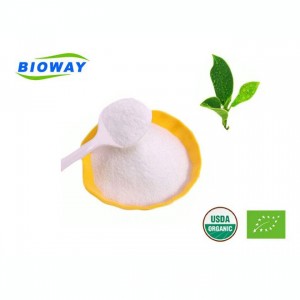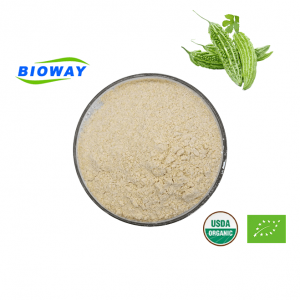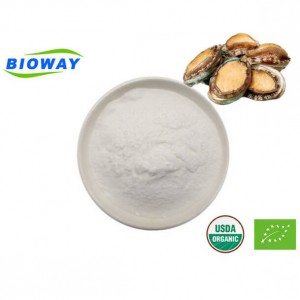Walnut Peptide with Low Pesticide Residues
Walnut peptide with Low Pesticide Residues is a biologically active peptide derived from walnut protein. It has been shown to have various potential health benefits, such as antioxidant and anti-inflammatory properties. Studies have also suggested that walnut peptide may have a role in reducing the risk of cardiovascular disease and improving cognitive function. Walnut peptide is a relatively new area of research, and more studies are needed to fully understand its potential benefits.
Walnut peptide is an important substance for repairing brain tissue cell metabolism. It can nourish brain cells, enhance brain function, replenish myocardial cells, purify blood, reduce cholesterol, remove "dirt impurities" in blood vessel walls, and purify blood, thereby providing better health for the human body. fresh blood. For the treatment of non-insulin-dependent diabetes. Prevent arteriosclerosis, promote white blood cells, protect liver, moisten lungs, and black hair.
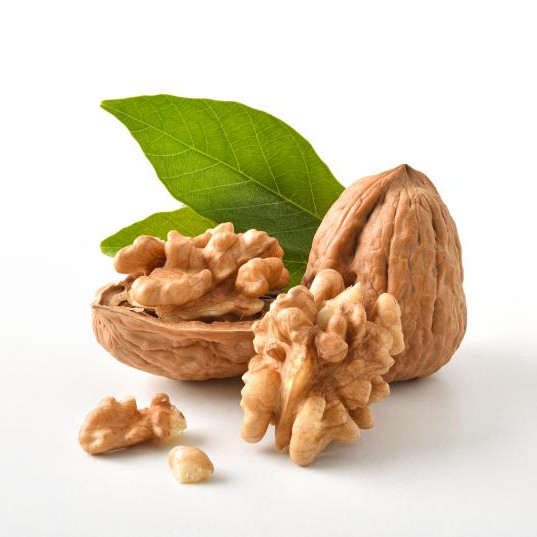
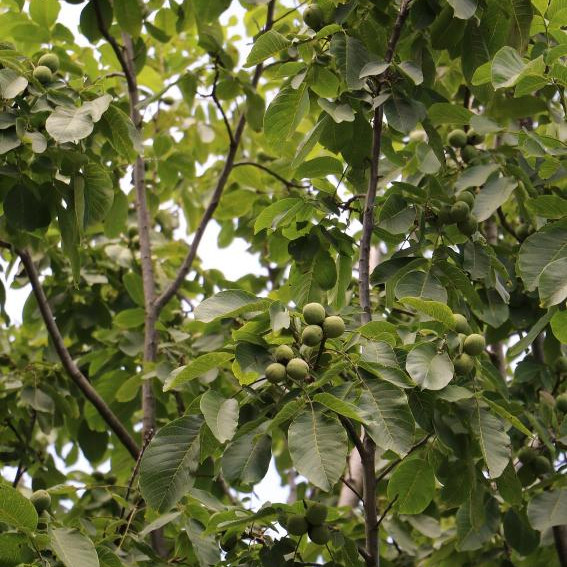
| Product Name |
Walnut Peptide with Low Pesticide Residues |
Source | Finished Goods Inventory |
| Batch No. | 200316001 | Specification | 10kg/bag |
| Manufacturing Date | 2020-03-16 | Quantity | / |
| Inspection Date | 2020-03-17 | Sample quantity | / |
| Executive standard | Q/ZSDQ 0007S-2017 | ||
| Item | Quality Standard | Test Result | |
| Color | Brown,Brown yellow or Sepia | Brown yellow | |
| Odor | Characteristic | Characteristic | |
| Form | Powder ,Without aggregation | Powder ,Without aggregation | |
| Impurity | No impurities visible with normal vision | No impurities visible with normal vision | |
| Total Protein (dry basis %) | ≥50.0 | 86.6 | |
| The peptide content(dry basis %)(g/100g) | ≥35.0 | 75.4 | |
| Proportion of protein hydrolysis with relative molecular mass less than 1000 /(g/100g) | ≥80.0 | 80.97 | |
| Moisture (g/100g) | ≤ 7.0 | 5.50 | |
| Ash (g/100g) | ≤8.0 | 7.8 | |
| Total Plate Count (cfu/g) | ≤ 10000 | 300 | |
| E. Coli (mpn/100g) | ≤ 0.92 | Negative | |
| Molds/Yeast(cfu/g) | ≤ 50 | <10 | |
| Lead mg/kg | ≤ 0.5 | <0.1 | |
| Total Arsenic mg/kg | ≤ 0.5 | <0.3 | |
| Salmonella | 0/25g | Not be detected | |
| Staphylococcus aureus | 0/25g | Not be detected | |
| Package |
Specification:10kg/bag ,or 20kg/bag Inner packing: Food grade PE bag Outer packing: Paper-plastic bag |
||
| Shelf life | 2 years | ||
| Intended Applicatons |
Nutrition supplement Sport and health food Meat and fish products Nutrition bars, snacks Meal replacement beverages Non-dairy ice cream Baby foods, Pet foods Bakery, Pasta, Noodle |
||
| Prepared by: Ms. Ma | Approved by: Mr. Cheng | ||
1.Rich in Antioxidants: Walnuts are known to contain high levels of antioxidants, which help to protect the body against damage from free radicals. The antioxidants in walnut peptide products may help to reduce the risk of chronic diseases such as cancer, Alzheimer's disease, and heart disease.
2.Source of Omega-3 Fatty Acids: Walnuts are a good source of omega-3 fatty acids, which are essential for brain function, heart health, and reducing inflammation. Walnut peptide products can provide a concentrated source of these important nutrients.
3.Low in Calories and Fat: Despite their many health benefits, walnuts are relatively low in calories and fat. Walnut peptide products can be a convenient way to add walnuts to your diet without consuming too many extra calories.
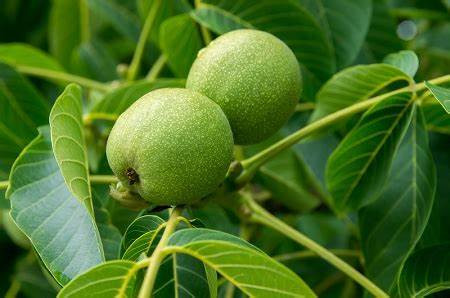
4. Easy to Use: Walnut peptide products are available in various forms, including capsules, powders, and extracts. This makes them easy to use on a regular basis as part of a healthy diet.
5. Safe and Natural: Walnut peptide products are generally safe and well-tolerated by most people. They are made from natural ingredients and are free from harmful chemicals and additives.
However, it is important to follow the recommended dosage and speak with a healthcare provider before starting any new dietary supplemen
1.Promoting Cardiovascular Health: Walnuts are rich in omega-3 fatty acids, which can help to reduce cholesterol levels and improve blood flow throughout the body. This can lower the risk of heart disease, stroke, and other cardiovascular conditions.
2.Boosting Brain Health: Walnut peptide products may help to improve cognitive function, memory, and concentration. They contain antioxidants and omega-3 fatty acids that can protect the brain from damage and support healthy neurological function.
3. Reducing Inflammation: Walnut peptide products may help to reduce inflammation throughout the body. Chronic inflammation has been linked to a range of health conditions, including cancer, arthritis, and heart disease.
4. Supporting Immune System Function: Walnuts are rich in antioxidants and other nutrients that can help to strengthen the immune system. This can reduce the risk of infections and other illnesses.
5. Providing Anti-Aging Benefits: The antioxidants in walnut peptide products can help to protect the skin from damage caused by free radicals and environmental factors. This can help to reduce the appearance of fine lines, wrinkles, and other signs of aging.
1.Dietary Supplements: Walnut peptide products are most commonly taken as oral supplements. These supplements come in pill, capsule, or powder form and can be added to food or drink.
2.Skin Care: Some walnut peptide products are formulated for topical use on the skin. These products may be creams, serums, or masks. They can help to nourish and hydrate the skin, promote a more even skin tone, and reduce the appearance of fine lines and wrinkles.
3.Hair Care: Walnut peptide products may also be used in hair care formulations, such as shampoos, conditioners, and hair masks. These products can strengthen hair, prevent breakage, and promote scalp health.
4. Sports Nutrition: Walnut peptide products are sometimes marketed to athletes and fitness enthusiasts as a way to support performance and recovery. They may be added to protein shakes or other sports nutrition products.
5. Animal Feed: Walnut peptide products may also be used as a supplement for livestock and other animals. They are believed to have benefits for overall health and growth in these animals.

Once the raw material (NON-GMO brown rice) arrives to the factory it is inspected according to the requirement. Then, the rice is soaked and broken into thick liquid. After, the thick liquid goes through the colloid mild slurry and slurry mixing processes thus moving to the next stage – liquidation. Later, it is subjected to three times deslagging process following which it is air dried, superfine grinded and finally packed. Once the product is packed it is high time to check for its quality. Eventually, making sure about the products’ quality it’s sent to warehouse.

Storage: Keep in a cool, dry, and clean place, Protect from moisture and direct light.
Bulk Package: 25kg/drum.
Lead Time: 7 days after your order.
Shelf Life: 2 years.
Remark: Customized specifications also can be achieved.

20kg/bags
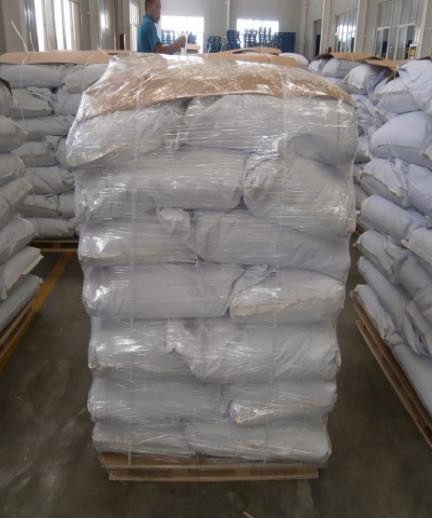
Reinforced packaging

Logistics security
Express
Under 100kg, 3-5Days
Door to door service easy to pick up the goods
By Sea
Over300kg, Around 30 Days
Port to port service professional clearance broker needed
By Air
100kg-1000kg, 5-7Days
Airport to airport service professional clearance broker needed

Walnut Peptide with Low Pesticide Residues is certified by USDA and EU organic, BRC, ISO, HALAL, KOSHER and HACCP certificates.

Walnuts are a good source of protein and contain some of the essential amino acids, but they do not contain all nine essential amino acids in significant amounts. For example, while walnuts are rich in the amino acid arginine, they are relatively low in the amino acid lysine. However, by combining walnuts with other foods that are good sources of the missing amino acids, such as legumes or grains, a person can obtain all nine essential amino acids and meet their daily protein needs.
You can pair walnuts with any of the following foods to make a complete protein: - Legumes (e.g. lentils, chickpeas, black beans) - Grains (e.g. quinoa, brown rice, whole wheat bread) - Seeds (e.g. pumpkin seeds, chia seeds) - Dairy products (e.g. Greek yogurt, cottage cheese) A few examples of meals/snacks that combine walnuts with other foods to create a complete protein could be: - A lentil and walnut salad with quinoa and leafy greens - Brown rice with roasted vegetables and a handful of walnuts - Whole wheat toast with almond butter, sliced bananas, and chopped walnuts - Greek yogurt with honey, sliced almonds, and chopped walnuts.
While walnuts contain protein, they are not a complete protein source on their own, because they don't contain all the essential amino acids that the body needs. Specifically, walnuts lack the amino acid lysine. Therefore, to get all the essential amino acids through a plant-based diet, it's important to consume a variety of protein sources, combining them to make complete proteins.

